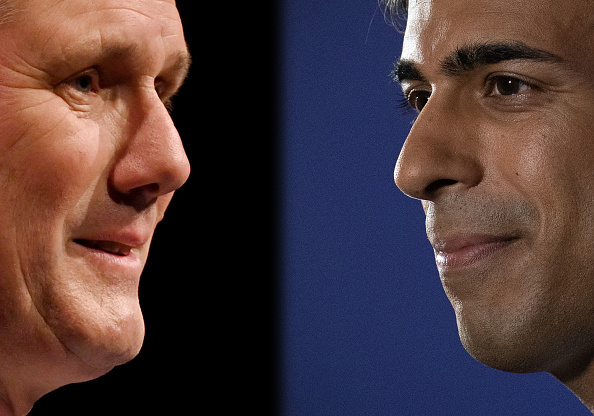Sunak and Starmer have both realised just how close they are to an election

Political cunning and policy gimmicks won’t distract voters if their lives haven’t improved, Will Cooling writes, on Sunak’s war on universities and Starmer’s U-turn on the two child welfare cap.
It is easy for those of us obsessed with Westminster to get annoyed with politicians doing politics. We can indulge our ideas and passions free from accountability, whereas they have the dreary task of having to win elections. After all, without power, it’s incredibly difficult to put your ideas into practice.
So perhaps we should resist the urge to be too annoyed at the Labour leadership announcing that if elected they wouldn’t end the two-child limit for benefits and would maintain a broader hardline against increased welfare spending. After all, maybe swing voters really would react badly to such policies, either on ideological grounds, or due to seeing them as the harbinger of higher taxes.
The only problem is that the policy is one that will continue misery and pain to some of the least fortunate in our society, punishing children for their parents’ mistakes or misfortune. Removing the two-child cap would lift a quarter of million children out of poverty entirely and improve the lives of a further 850,000. What is the point of the Labour Party if it cannot find £1.3bn a year to do this?
While political skill and cunning is indeed necessary to win elections, the victors will then actually have to govern. All the tactics and gimmicks in the world will not long distract people from a government that does not improve their lives.
And you can see this with the mess that the Tories have gotten into with higher education. On Monday, Rishi Sunak announced a “crackdown” on rip-off degrees, pledging to deny funding to courses that failed to secure graduates a highly skilled job or postgraduate study within fifteen months of leaving university. If meaningfully applied, Sunak’s ideas would not only cause course closures and risk some universities going bankrupt, but it would also create perverse incentives for all institutions to push graduates into jobs or study that may not be best for them in the long-term.
But the policy is not just itself a mistake, it is the consequence of the Tories failed approach to higher education. They abandoned all semblance of student number controls; despite warnings it would become unsustainable without additional funding once children born in the noughties mini-baby boom started applying. They developed and published performance metrics, including on graduate outcomes, in the hope that this would drive applicants to make informed and rational choices about where they would study, only for young people to continue to place great weight on intangibles such as the location and reputation of a university.
The fatal flaw in today’s higher education system goes back to when David Cameron was the fresh-faced, newly appointed Tory leader. Like Starmer today, Cameron wanted to move his party on from just opposing the government, instead adopting a more sophisticated approach that would reassure people that the Conservatives were serious about delivering high quality public services. So, he abandoned Michael Howard’s policy of pursuing an end to tuition fees by reducing student numbers, embracing Labour’s goal of widening access to higher education.
The problem was that Cameron didn’t want to maintain the level of public investment in universities he inherited from New Labour. His governments would oversee significant cuts to public funding but felt that they could avoid trashing our universities by loading the costs onto graduates by trebling tuition fees. This not only distorted universities in ways that cut against the government’s objectives elsewhere in the education system, but set the scene for the beartrap Sunak is trying to sidestep today; what do you do when inflation means it’s time for tuition fees to go above what are already higher than any comparable system in the world? Instead of raising tuition fees to something like £13,000 a year or increasing taxes so public investment could cover the shortfall, he is instead returning to Howard’s idea of reducing costs by narrowing access.
Both Rishi Sunak and Sir Keir Starmer like to say that these policies are signs that they can take the tough decisions that others lack the stomach to make. But they’re actually just kicking those least fortunate in our society because they’re too “frit”- as Margaret Thatcher, my fellow East Midlander would’ve said – to tell those more fortunate that they need to pay more.
They may be right to fear the public can’t handle this truth, but telling people what they want to hear is the very opposite of courage, and such cravenness over the past thirteen years has hardly created a Britain that works, has it?
